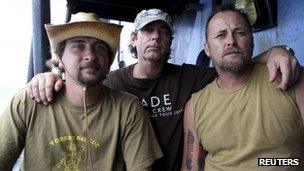Japan to return Australian whaling activists
- Published

The three men boarded the Shonan Maru No 2 in darkness early Sunday
Three anti-whaling activists who boarded a Japanese ship will be handed over to an Australian customs ship, Australian leader Julia Gillard said.
The men from the Forest Rescue Australia group could have faced charges under Japanese law.
They boarded the Shonan Maru No 2 early on Sunday, about 26km (16 miles) off the west coast of Australia.
"We thank the Japanese government for their cooperation in this matter," Ms Gillard said through a spokesman.
However, she warned, it should not be assumed that ''individuals will not be charged and convicted in the future''.
"Activity of the nature undertaken by these three Australians is unacceptable,'' she added in a statement.
The men, all from Western Australia, were named as Geoffrey Owen Tuxworth, 47, Simon Peterffy, 44, and Glen Pendlebury, 27.
The Australian customs ship has left port, but it could take ''several days'' to reach the Shonan Maru at sea, depending on the weather, Ms Gillard said.
Forest Rescue said in a statement that the trio boarded the vessel to prevent it from tailing a ship belonging to anti-whaling group Sea Shepherd.
That ship, the Steve Irwin, was on its way back to the Southern Ocean, where Japanese whaling ships hunt at this time of the year, after escorting a damaged vessel back to Australia.
The Shonan Maru was thought to be watching the anti-whaling vessels to help the Japanese fleet avoid protesters.
Court action 'best way'
There has been a ban on commercial whaling for 25 years, but Japan catches about 1,000 whales each year in what it says is a scientific research programme.
Critics say it is commercial whaling in another guise.
Australia is a strong opponent of whaling. Last year, it filed a complaint against Japan's whaling activities in the Southern Ocean at the international court in The Hague aimed at ending the practice. A decision could be announced next year.
"The best way to stop whaling once and for all is through our court action," Ms Gillard added.
This is not the first time activists have boarded Japanese whaling ships.
In 2010 New Zealander Pete Bethune boarded a ship which subsequently took him to Japan. He spent five months in jail after receiving a two-year suspended sentence and was later deported.
In 2008 Australian Benjamin Potts and another activist were handed over to an Australian customs ship after they boarded a Japanese ship in the Southern Ocean.
- Published9 January 2012
- Published29 December 2011
- Published5 October 2011
- Published13 July 2011
- Published10 July 2011
- Published16 February 2011